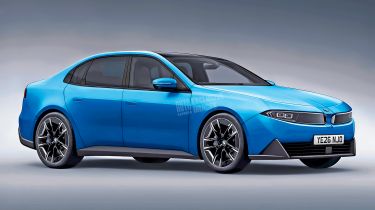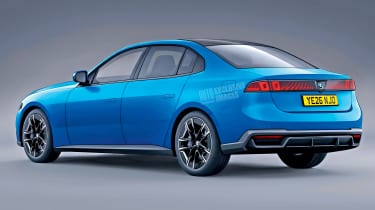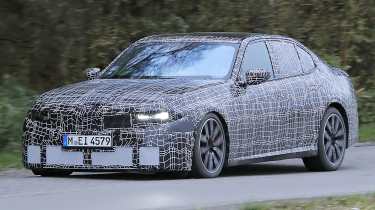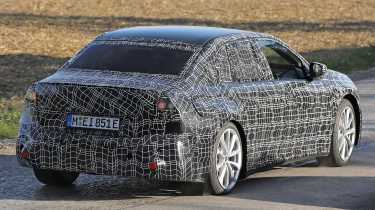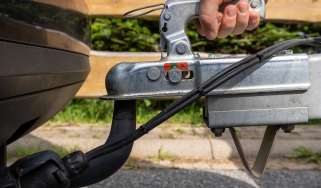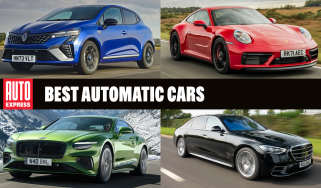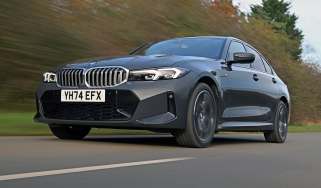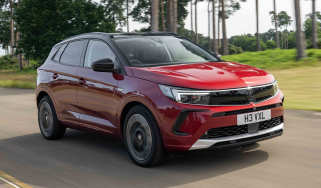New BMW 3 Series to pioneer German brand’s bold design change in 2026
The design of the EV and ICE 3 Series will remain true to the show-stopping Vision Neue Klasse concept revealed last year
The arrival of a new BMW 3 Series has always been a hugely important moment. But the stakes are even higher this time, with the next-generation saloon playing a critical role in launching the so-called ‘Neue Klasse’ – ushering in a new era for BMW design and technology.
That translates to ‘new class’ in English, and refers to “at least six” new models that BMW CEO Oliver Zipse says will be launching within just 24 months of each other, starting next year. The first will be an all-electric mid-size SUV to serve as a rival to the Audi Q6 e-tron, and a replacement for the BMW iX3.
The new 3 Series saloon, meanwhile, is set to arrive in 2026, and will be available with a choice of internal combustion or pure-electric power, much like its future main rival: the next-generation Mercedes CLA. This plan of attack differs to what Audi will offer – with two distinct EV (badged A4) and ICE (A5) options.
Auto Express understands that the electric version of the 3 Series – which could reintroduce the i3 name previously used by BMW’s trailblazing electric city car, though that’s yet to be confirmed – will sit on an all-new, bespoke EV platform. Petrol variants on the other hand will use the current model’s underpinnings, probably with a similar selection of engines too.
Despite the differing platforms, recent spy pictures show the i3 and 3 Series will share the same Neue Klasse design language – as visualised in our exclusive images.
This strategy is employed by sister brand MINI on its latest Cooper hatchback, which sees styling cues shared between the petrol and EV models, with slight differences to things like the overhangs, roofline and door handles. The cabin design and tech onboard are identical.
The new 3 Series echoes the show-stopping Vision Neue Klasse concept of September 2023. It introduced us to BMW’s next-generation design language, and will influence almost everything we see from the brand over the next few years.
Instead of a swooping silhouette like the forthcoming CLA, the new 3 Series has a much more traditional three-box saloon shape, squared-off edges and a relatively blocky front end. Classic BMWs have clearly served as inspiration here, which is no surprise, because the name ‘Neue Klasse’ is a reference to when the brand went through a major transformation in the sixties – with cars like the 1500 and 2000 saloons.
The front end will be defined by a new interpretation of BMW’s iconic kidney grilles, which are slimmer than those on some existing models like the 4 Series coupé or 7 Series limousine, and wrap around the face of the car. The kidney grilles will also house some of the sensors and other tech needed for the advanced driver- assistance systems.
The traditional Hofmeister kink in the rear window line is clearly visible, while pronounced wheelarches give the new 3 Series a planted stance. However, while the heavy camouflage does a good job of hiding finer details – such as the intricate front bumper – the concept’s LED strakes appear to have been replaced by conventional headlights, and its digitised wing mirrors switched for conventional ones on the test car, too.
While our spy photographers couldn’t get a look inside the car, based on the Vision Neue Klasse concept, the interior of the new 3 Series will be minimalist and designed around the principle of “eyes on the road, hands on the wheel” driving.
Technology will include next-generation iDrive infotainment software, and a brand-new set-up called ‘Panoramic Vision’, which does away with an ordinary instrument cluster and projects information across the base of the windscreen.
It’ll be complemented by a 3D head-up display, while easy access to other functions will come from buttons on the steering wheel. However, if the concept is anything to go by, the iDrive rotary controller will not make an appearance.
The EV version will use a brand- new scalable platform that has been “uncompromisingly optimised for electric drivetrains,” says BMW. It will feature an 800V electrical architecture, which allows ultra-rapid charging speeds – supposedly fast enough to add 186 miles (300km) of range in only 10 minutes.
That’s thanks in part to BMW’s latest, sixth-generation eDrive powertrain technology, which uses cylindrical battery cells that deliver up to 20 per cent better energy density, 30 per cent more range and 30 per cent faster charging than current powerpacks. These cells will also be used as a part of the structure of Neue Klasse models, plus on certain cars, the cells can be packed differently to maximise space.
For context, the current BMW i4 electric saloon offers a range of up to 373 miles, which suggests the new i3 – or whatever it may be called – will manage over 400 miles of range.
For those not interested in the EV, the combustion engine line-up for the new 3 Series should resemble the outgoing model’s, which dropped diesels during its second refresh earlier this year. Buyers can choose from a plug-in hybrid that offers a pure-electric driving range of up to 63 miles, or 2.0-litre four-cylinder and 3.0-litre straight-six mild-hybrid petrols.
We’ve also seen the combustion-engined 3 Series testing (below), confirming the ICE and EV cars will look almost identical. The test car has quad-exhausts, but don’t go thinking this is the flagship M3; the smaller M135 has shown BMW is willing to use this layout on lesser models so the car here could be the new M340 (or M350) instead – especially given the lack of beefy arches and side vents. In order to keep a similar face to the i3, the petrol 3 Series features a blanked-off grille, with cooling in the lower section of the front bumper.
That said, the next-generation BMW M3 won’t be far behind. it’s set to be revealed in 2027 before going on sale the following year. It will also be offered with both petrol and electric powertrains – the latter is likely to use a quad-motor set-up that’s been in the works for a while, which we’re told can deliver up to 1,341bhp in its most potent form.
Can't wait? These are the best executive cars to buy...

